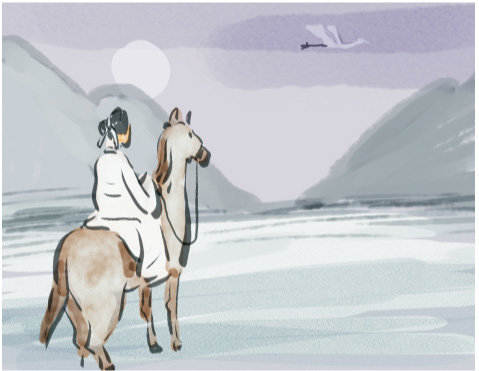Earnest desire
Earnest desire
Posted August. 26, 2022 08:00,
Updated August. 26, 2022 08:00

The poet hits the road early in the morning with only silence in the air. Riding on his horse, he dozes off down the road. As the poet “has not even heard any rooster crowing while traveling miles,” he seems as if he were wandering in a dream all the way through the mountains and hills even without any dwelling in his sight.
Waking up surprised by fallen leaves blowing in the wind, the author notices a crane flying away under the morning moon sitting on the ridge. A bleak, pale road covered with frost has been a lonely journey. A young boy waiting on the traveler must have been grumbling about managing to get up early in the morning to depart and handling a long and boring walk with not any other passer-by on the endless road. This makes us wonder why the poet abruptly writes, “What a peaceful time is lying on a smooth road,” although he must feel lonely enough to liken himself to a lonely crane. These not-so-comforting words may leave the servant boy confused about what his master means by that. Does he joke to cheer up the kid or murmur wishing to walk a smooth path in a peaceful time?
This poem was devised by the author, on leave, traveling all the way from Jangan to Jiangnan to see his younger brother, weak and sick. Taking care of the brother for long, he could not protect him from going blind due to eye disorder. Left in frustration and sorrow, the poet was obviously driven by compassion. Walking with a heavy heart on a deeply dreary morning, he might have hoped for the better days to unfold sooner or later down the road.



![아침 공복 따뜻한 물 한 잔, 정말 살 빠지고 해독될까?[건강팩트체크]](https://dimg.donga.com/c/138/175/90/1/wps/NEWS/IMAGE/2026/03/05/133467930.3.jpg)



